Trusted lifestyle publications have learned to walk a fine line between addressing a specific niche and having widespread appeal. The best of them answer felt needs for many…but without becoming too narrow. After all, they are striving to provide valuable insights and information and attract advertising revenue.
Some of the publications on this list are well-known. However, others you may not have heard of previously. They represent a mixture of blogs and magazines, many of them blurring the distinction in the process. Check out the ones that spark your interest. Poke around for a bit. We've listed our top picks in alphabetical order. Enjoy!
Camille Styles
As a college student, Camille Styles thought she was going to use her journalism degree to become a magazine editor. However, along the way, she worked for a catering company. Styles found, to her surprise, that she absolutely loved event planning. In her own words, she found it difficult to believe that she was getting paid to merge her passions for cooking, design, and bringing people together.
On her lifestyle site, Styles currently oversees what is arguably one of the most eye-pleasing, helpful, and fun lifestyle publications. As a result, if you share her passion for food, gathering, design, beauty, wellness, and more, check out CS. It's filled with engaging content, thoughtfully articulated, and beautiful to behold at the same time.
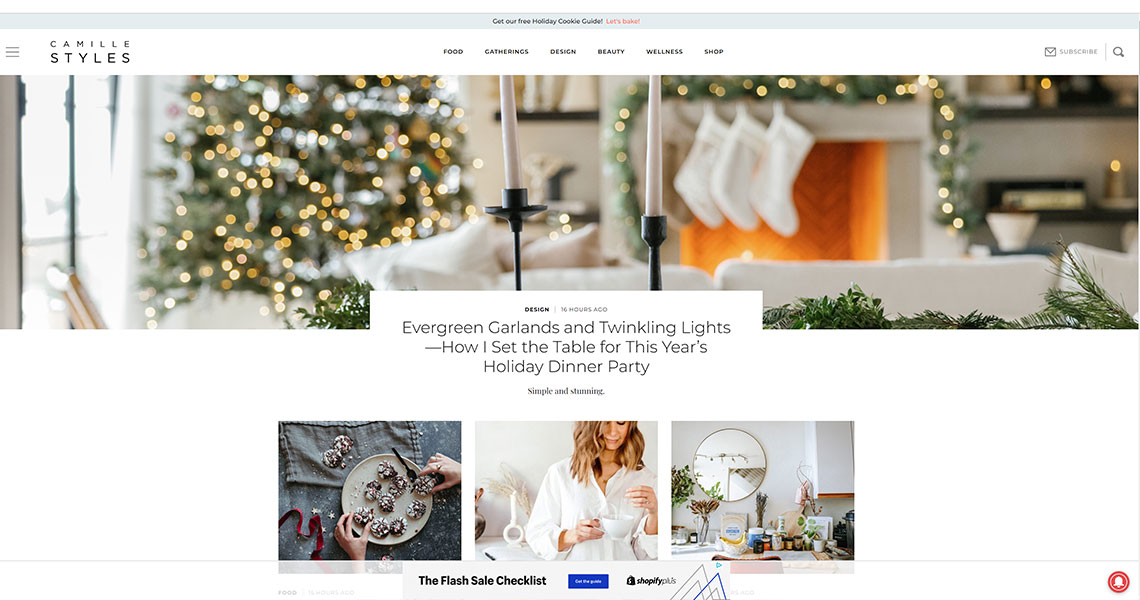
Conscious Lifestyle
With a core value of believing that we must be the change we wish to see, Conscious Lifestyle seeks to help people overcome challenges common to much of the human race. It's a pretty tall order, but the editors take an open posture toward issues of mind, body, and spirit.
The focus of this lifestyle publication is to provide practical tips, tools, and techniques. Consequently, these help others move in the direction of happiness, health, and healing. The site intentionally provides a platform for the world's leading thinkers, philosophers, and leaders. It zeroes in on material that anyone can access.
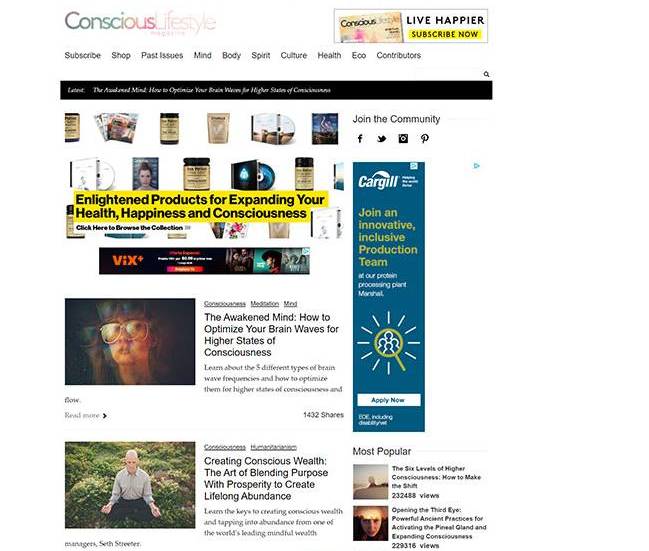
Entertainment Weekly
Who doesn't enjoy unwinding with some quality entertainment, especially during times of cultural upheaval, heightened stress, and economic uncertainty? The editors behind Entertainment Weekly totally get it. As a result, they strive to make sure we make informed, insightful decisions about the various forms of media on which we spend our time and money.
Wondering if it's worth it to catch Marvel's latest release in the theater? Not sure if the series your best friend won't stop jabbering about is really as good as he says it is? EW can help you sift through all of the attendant hype that surrounds anything in its initial days of release. This is true whether it's a movie, TV series, book, or theatrical tour. However, be warned up front. You might lose track of time once you start digging into the print magazine or website.
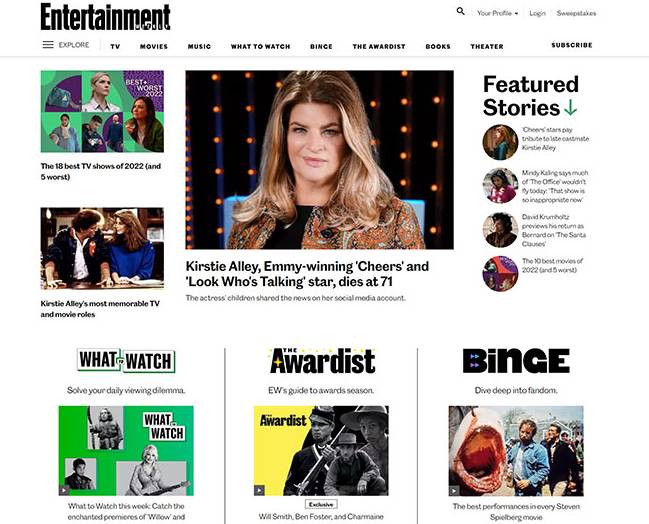
The Financial Diet
Far too many people put off learning about the ins and outs of money management and investments for good reason. On the other hand, many financial publications take as their operating assumption that their readers are already financially savvy. Not so with The Financial Diet. The editors at this lifestyle publication work hard to demystify issues of finance for the average reader looking to learn more.
Whether your intent is to become financially wise or simply to solve an immediate problem related to money, give the Financial Diet website a spin. You'll likely find articles about nailing that important job interview, how to create a simple budget, and even whether or not organic food is worth the hefty price tag. In short, end any embarrassment you might have about money issues today by checking out TFD.

Food Network
The folks at Food Network recognize that we all need to eat but are committed to helping us do it well. The namesake magazine shows up in the mail to an astonishing 100 million U.S. households and currently holds the No. 2 position in terms of best-selling magazines on the newsstand racks. Clearly, the editors of this lifestyle publication are doing something right.
Food Network isn't merely a collection of recipes, as the uninitiated might expect. Instead, it seeks to empower readers to move into a higher realm of food preparation and consumption as it seeks to fulfill its goal of being "food's best friend." Consequently, content is educational, helpful, diverse, and (let's just say it) jaw-dropping in its visual appeal. If you've been wanting to take your food habits to the next level, this is the site for you.
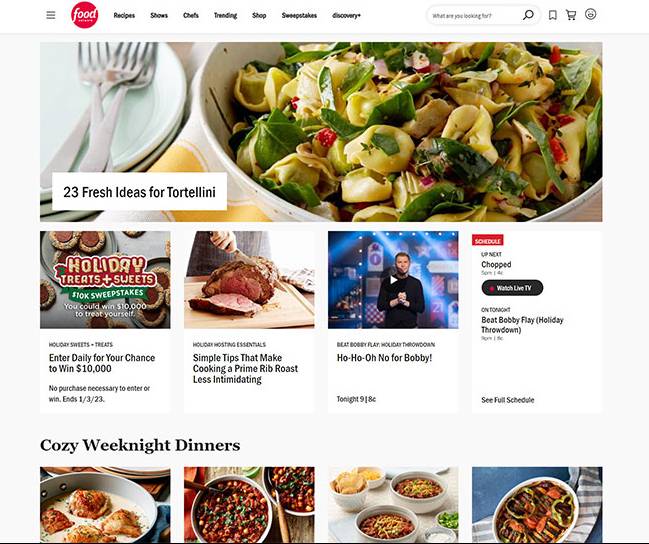
Good Housekeeping
The very first print issue of Good Housekeeping was published in 1885. With well over a hundred years of experience under its belt, the folks at this magazine obviously know what they are doing. The magazine has never swerved from its original calling to provide helpful information out of a sense of public duty matched by private interest.
This high calling serves its readers well. Others describe the editorial team at GH as ruthless in its fact-checking and commitment to accuracy. In this way, they help their readers make informed, reliable decisions with just about everything that touches their lives. If you are looking for dependable, authoritative information regarding food, beauty, holidays, and more, this lifestyle publication should be one of the first you consult.

He Spoke Style
If you're a guy looking to give your outward impression a serious upgrade, consider making He Spoke Style your first destination. Unlike many men's style lifestyle publications, the writers and editors at HSS shoot straight. They do so without a lot of fuss or even a hint of pretentiousness. The publication has been featured in the New York Times, Wall Street Journal, Esquire, and plenty of additional top-tier media.
The emphasis at HSS is on practicality and attracting "regular guys" as readers. Guys who maybe don't have thousands of spare dollars lying around. Since its launch over a decade ago, HSS has grown to include its own line of menswear. Likewise, the experts at HSS even offer complimentary consultations and personal styling tips via Zoom. If you find it slightly intimidating to walk into a menswear store, give the folks at HSS a shot.

Martha Stewart Living
While the emphasis tilts toward the upscale, everyone can find something of interest. Filled with helpful, practical tips and advice, the team at Martha Stewart Living offers up great recipes, DIY projects, beauty tips, gardening expertise, and much more.
Stewart has been an authoritative voice in lifestyle publications since 1982. That was the year her book Entertaining with Martha Stewart first hit the shelves. Since that time, MSL has grown to become a huge international presence. Her enduring commitment to making life easier, inspirational, and a little more beautiful has never wavered. For some of the best advice on health, pets, weddings, food, home design, and more, make MSL a regular destination.
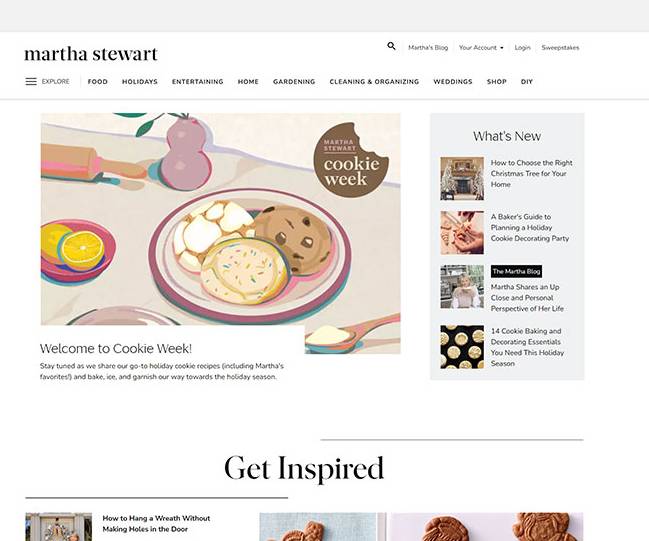
Men's Health
Print editions of Men's Health are currently available in 25 editions in 35 countries. Add to that more than 21 million readers in print and online, and MH represents a formidable presence in the world of fitness, nutrition, and weight loss. The publication also offers advice on menswear, scientific breakthroughs, gear, movies, and more, all targeted at guys.
The commitment to service journalism runs deep at MH. Rigorous fact-checking, licensed experts, and experienced staff make it a worthwhile read. MH has been awarded many of the top publishing industry honors. These include the Ad Age distinction of being named one of its Magazines of the Year in 2017. The coverage typical of MH is informative while avoiding the trap of being overly promotional.
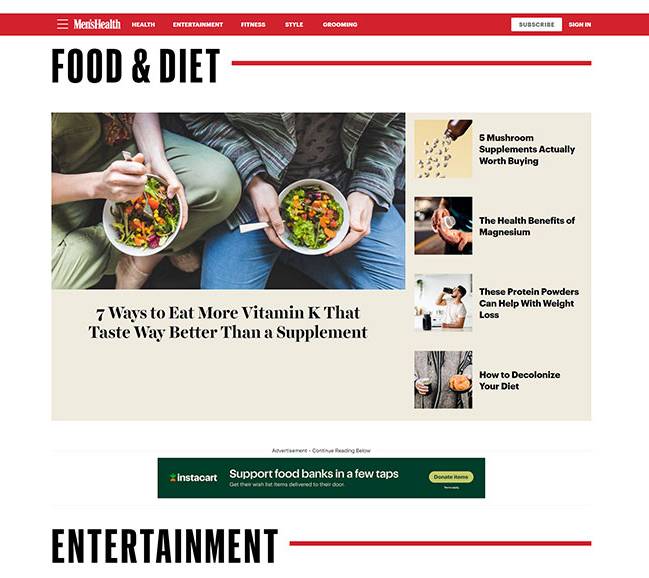
NewsReports
If you're interested in availing yourself of several life hacks and tips that cover just about any topic making headlines, make NewsReports your next lifestyle publication to visit. The folks behind NR value substance over hype and do their best to steer readers to the latest great apps, technology innovations, health news, and more. NR is an online-only publication committed to helping you become more productive and well-informed.
The NR effort began as a humble website dedicated almost exclusively to helping its readers wade through the mind-numbing array of options available on the Apple Store or Google Play. It never let go of that niche expertise. The writers and editors expanded and now scour the headlines for noteworthy innovations, so you don't have to. If you're looking to move past headlines and hype, give NR a look.

The Pioneer Woman
It might help to think of Ree Drummond's monolithic lifestyle publication as "Martha Stewart for the blue jeans crowd." In addition to the usual sections on food, decorating, health, beauty, and style, Drummond peppers The Pioneer Woman with information and snapshots from her personal life. The overall effect is one of exchanging recipes with your next-door neighbor over a glass of minty iced tea.
Drummond launched her website over 15 years ago. She had zero intention of launching a media behemoth, yet her publication transcends lifestyle genres in a way readers clearly enjoy. TPW answers a market segment that wants the information, yes, but also wants to know a little bit about the people providing it. Here you'll find articles with non-traditional titles such as "Todd Played His Last High School Football Game" and "Photos of Chuck."

Southern Living
The reach of Southern Living extends far beyond its initial target audience of the southern U.S. without losing its focus on the culture and traditions of the American South. Launched in February of 1966 by The Progressive Farmer Company, SL has stayed true to its vision. It celebrates what's glorious about the South "in all its complexity" and adds diverse and dynamic voices to the conversation.
Rigorous fact-checking and an unwavering commitment to accuracy make SL a lifestyle publication that is both dependable and entertaining. If you are looking for interviews with experts, creative food ideas, home and garden tips, and a whole lot more, look for SL to serve it all up. The editors present it all with a southern flair that is sure to appeal to just about anyone from any walk of life.

Verve
Headquartered in South Bombay, Verve was launched by Anuradha Mahindra in 1995 to offer a platform for the voices of recognized talent to express themselves. The namesake website followed in April 2014. The claim to fame here is being India's very first women's luxury lifestyle monthly. Verve offers its readership a glossy print version and has as its primary emphasis content of consistently high quality.
Verve tailors its content to a very specific niche. Over time, the publication has grown as its articles on arts and culture, people, fashion, travel, events, and more appeal to a considerably larger audience. Do you have an interest in getting a global perspective and approach to service journalism? Verve is a lifestyle publication well worth your attention.

Wit and Delight
True to its moniker, Wit and Delight advertises itself as "a home to professional feelings feelers, an elevator for glass ceiling breakers, and a soapbox for stories on anything from home decor and tile to battling anxiety and depression." And that pithy description pretty much sums up what you will find within. Never taking itself too terribly seriously, W&D tells important stories with a flair missing from many other website destinations.
The emphasis here is on stories that were developed as a result of real-world experiments out in the world of "adulting." If you're immediately drawn in by a no-nonsense approach to topics of importance, giving yourself 30 minutes with W&D is a dangerous undertaking. You'll pop in for a quick look and maybe miss picking up the kids from school. This lifestyle publication is long on useful information and enjoyable reading.

Content continues its reign as the king in marketing, and rightfully so. Seventy percent of marketers actively invest in content marketing. Likewise, 72% claim that having a solid content strategy is a major element of their success. As a result, emerging and established brands alike are taking advantage of the benefits of content marketing to help grow their business.
What is content marketing?
Simply put, content marketing is defined as a strategic marketing approach that helps form strong relationships with your audience. This relationship is nurtured through valuable and relevant content (in a variety of formats) on a consistent basis.
Content marketing is essentially when you put useful information in the hands of your target audience. Traditional marketing, on the contrary, is when you go after your audience and attract them with the information you want them to receive.
Because content marketing is defined by the audience's interest, it is usually far more effective than traditional digital marketing approaches such as paid advertising, email campaigns, and sponsored marketing.
Some of the most popular formats for content marketing include blog articles, videos, infographics, case studies, e-books, webinars, podcasts, social media posts, email newsletters, presentations, brochures, and more. Potential customers are already looking for high quality content, your job is to make sure they find it via email marketing, video content, and/or paid ads.
As a small business, you might fall into the trap of thinking that producing quality content that stands out is the prerogative of big brand names with big budgets, large marketing teams, and lots of resources on their hands. But a content marketing strategy is possibly even more crucial for small companies. Even the smallest businesses can engage in outbound marketing, launch a popular social media channel, crank out good content, and use its brand personality to draw audiences into the sales funnel.
When compared to other forms of promotion, content marketing delivers some of the highest ROI for every dollar spent. Great content also offers benefits far outweighing the time and money that goes into it. Proven to be a cost-effective strategy, content marketing generates three times the leads at 62% less cost compared to traditional marketing approaches.
What are some of the main benefits of content marketing for your small business?
It will deliver ongoing value to your audience and drive engagement.
By providing your target audience with valuable content on an ongoing basis, you are giving them powerful motivation to come back for more. Fresh, relevant, trending content is your shot at boosting your audience's engagement whilst continuously enhancing your brand image.
It will build authority and trust.
Producing content that helps educate your audience about your business instead of blatantly promoting your services will help establish your authority and expertise. The more insight-driven, quality-focused content your company produces, the more people will consider you a thought leader within your niche.
Once your business is recognized as a go-to resource for valuable, expert information, you will gain your customers' long-term trust and loyalty. Every piece of relevant content you share will solidify your reputation as a reliable authority. This is true whether you are conducting a B2C or B2B content marketing effort.
Content is what will make your clients return when they have questions and eventually when they are ready to make a purchase.
It will support your digital marketing channels.
Successful marketers know that 100% original content goes a long way. That super-informative blog article that you just wrote can be shared on your social media channels, transformed into an impressive infographic, or featured in your newsletter, fueling the traction across all these platforms.
It will generate leads.
Lead generation is one of the benefits of content marketing. Think blogging, smart gated quality content, and strategically placed calls-to-action (CTAs).
Consistently publishing blog posts is an effective content marketing strategy. Expect your lead generation efforts to rise by 88% or 67% respectively, depending on whether you are a B2C or a B2B company, giving you unparalleled ROI for every marketing dollar spent.
Gated content usually comes in the form of e-books, blog articles, white papers, and even videos. Sought-after gated content generates leads by expanding your email contact list. Visitors fill out a contact form that provides their email address in exchange for access to the gated resource. These visitors willingly subscribe to your emails and look forward to them.
Strategically placed CTAs within your relevant and engaging content can also generate inbound marketing leads. By clicking on your CTA, visitors will move through the sales pipeline. This is perhaps the single greatest content marketing benefit.
It will boost your search engine rankings.
Without exaggeration, content marketing is the soul of your search engine optimization (SEO) efforts.
Influential content that visitors engage with contributes to your website's domain authority, strengthening your search engine rankings. Additionally, unique, creative content built around the right keywords and targeting the right audience via social media marketing gets indexed quickly and ranks better on Google.
Higher rankings, in turn, will lead to more traffic to your website.
How do I make content marketing work for my small business?
If you are looking to implement a content marketing strategy for your small business, here's how to do it.
Define and set SMART goals for your marketing campaign.
Most marketers already know that defining your purpose and setting goals are vital for content marketing.
Content strategy goals need to be specific, measurable, attainable, relevant, and timely. In other words, they need to be SMART. Here are good examples of SMART content marketing goals as you seek to raise brand awareness.
- Rank higher on Google and land on the first five pages within six months.
- Obtain 200 new email contacts in two months.
Identify and track your key metrics.
Define the key metrics that help you understand if your content marketing campaign is moving in the direction of your goals.
Content performance indicators include website traffic, unique pageviews, likes and shares, conversion rates, number of downloads, and bounce rate. According to the Content Marketing Institute, there are at least four content audit metrics to track over time.
Learn from the data. Adjust your content strategy and keyword research accordingly.
Select your target audience and marketing channel.
Before you start creating or promoting any type of content, make sure you clearly understand who your target audience is. Define their demographics, interests, personality types, and followings.
Once you figure out the who, identify where your audience is most likely to spend their time. Then pick the right digital channels to distribute your content. Consider blogs, social media platforms, email campaigns, and online forums to boost brand awareness.
Keep your content creation team to a publishing schedule.
Create a posting schedule and (as any experienced content marketer will tell you) stick to it. You can't significantly raise brand awareness and build customer loyalty with an occasional social media post.
Consistency is key when it comes to publishing great content. Similarly, avoid posting too often, not posting enough, or posting irregularly. Your end goal is to engage, not to overwhelm. Better to generate one killer blog post per week than 10 boring posts per day. Use your content marketing effort to drive long-term audience engagement.
Create. Adjust. Repeat.
To make the benefits of content marketing work, the quality of your ideas must translate into well-researched, valuable, engaging content.
Your great content needs to educate your audience and answer their questions. Produce fresh content with the same vigor you examine your target audience and marketing channels.
By continuously learning from your KPIs and tweaking your content strategy, you will develop a solid foundation of evergreen, relevant, and valuable information. Likewise, you will also build trust with your audience.
Content marketing can mean the difference between struggling to grow your customer base and taking your small business to the next level.
Whether you create the content in-house or hire a content marketing agency to do it for you, now is the time to embark on your content marketing journey.
Content marketing is nothing without a content marketing strategy. Content marketing strategies are critical to have in hand before you commit to a social media platform, engage in email marketing, develop interactive content, hire marketers, or even just conduct a brainstorming session for content ideas.
You can have the most interesting, thought-provoking piece of interactive content out there. You might have the world's greatest content marketer on staff. However, it's all for naught if it can't be found by the right people. Likewise, professional marketers know that great content means nothing if it doesn't reach its target audience.
No matter what stage of your content creation process you're in, whether you're in pre-planning - deciding on content format, conducting a content audit, or finishing up and wondering how to present your blog post to the world through social media marketing - now is the time to start thinking about the best content marketing strategy for optimizing and distributing that content to your audience.
Seasoned marketers know that the world's greatest content production workflow and search engine optimization tactic means nothing in the absence of a documented strategy. Similarly, content marketing strategies help convert existing customers into unpaid brand loyalty cheerleaders.
Do I Really Need a Content Strategy?
Yes! The point of your content is to be seen, read, heard, and, most importantly, shared as part of the average customer journey.
But what good is your high quality content if it's never seen? Why develop any top-notch content asset if it doesn't gain any traction in the marketplace? Research by the Content Marketing Institute has shown that countless brands who succeed at digital marketing develop and follow a content marketing strategy. As a result, they consider their content marketing efforts to be more successful and found content marketing, in general, to be less challenging.
Significantly, these companies were later able to justify a higher content marketing budget that allowed them to invest in higher quality content.
What Does a Successful Content Marketing Strategy Look Like?
Your content marketing strategy should be a part of any content creation your company does.
While there are no defined "rules" for building a content marketing strategy, it's important to include these nine key components in any content marketing effort. Make sure you address all nine of them before you create content, sink considerable resources into video marketing, build a content calendar, or engage in any form of content promotion.
1. Understand your audience better with a buyer persona and research.
Every piece of content your brand develops should be created with someone in mind.
A potential customer is more likely to make a purchase from a brand they identify with. Consequently, relevant content begins and ends with that brand demonstrating a keen understanding of its audience. Valuable content gets shared via social media and starts moving up in search engine results.
Understanding your target audience includes very basic factors such as their age, gender, education level, and even income. However, it also goes deeper than that. What does your audience want? What problems are they facing? Which social media channels do they seem to prefer? How can your product or service create content to help solve those problems?
Don't just assume. You won't hit upon an effective content marketing strategy by spitballing. Research your target audience and see who's already engaged with your brand. What content type hits home consistently? Can you create content that answers felt needs?
Additionally, you can even set up simple online surveys to send via email marketing to your current audience. Build audience profiles and your content calendar based on the results. Begin to have your creative types sketch out some content marketing examples they think might be seen as in tune and responsive. However, your audience won't fit a single category. On the other hand, research can help you develop a primary "buyer persona" that fits the profiles of much of your audience, as well as several secondary personas.
2. Conduct some keyword research.
Now that you understand your main audience, place yourself in their shoes as you consider various content marketing strategies.
What are they searching for when they need your product or service? Make a list of basic keywords surrounding your brand, as well as any variations: "New York painters" and "New York painting," for example. You know your niche well, so draw from all possible terms used for what you have to offer.
Once you have these keywords, you're ready to do some digital marketing. Integrate them into your content. Here are a few reasons why.
- Integrating keywords into blogs and other online content is good for SEO and generating organic traffic.
- It allows your audience to figure out quickly whether or not they've found the content they need before moving on.
- It establishes your brand as an authority in your field.

3. Identify effective content.
Next, you need to ask yourself, "What sort of content will my audience respond to? What content format are they looking for?" If your audience is more likely to read a blog post, would you waste time creating a video? Do they enjoy email marketing more than SMS texting? In the same vein, if they want how-to guides, will they spend hours looking at case studies that only tell them "Why?" Probably not.
Identifying the most effective content starts with identifying and listing to your audience. However, it will likely also include some trial and error as you experiment with different types of content to see what works for you and your content strategy. In short, the most common types of content include:
- blog post, articles, how-to guides;
- infographics;
- video content;
- eBooks and white papers;
- email newsletters;
- social media posts;
- podcasts; and
- eCourses and webinars.
4. Decide on placement.
Another reason to develop an understanding of your audience is to determine where they're looking for online content.
Are they searching YouTube for the latest videos on your niche...or do they spend most of their free time browsing Instagram for great photos? Similarly, are they likely to respond to (often expensive) Facebook ads?
For content such as blogs, articles, and landing pages that lead to additional content, implementing an SEO strategy is a good place to start. However, it's also important to maintain active business pages for any relevant social media platforms. Likewise, influencer marketing can be another effective way to expand the reach of your content and build brand awareness.
5. Develop your brand's voice.
The most successful brands develop a "personality" that their audience can recognize and identify with. This is often overlooked in content strategy, but it's also one of the most important aspects of a brand.
As with every stage of your content marketing strategy, start with your buyer personas. What sort of personality will they most identify with? Is that voice friendly, formal, or silly? What sort of language and terms will they understand? Where does this crowd gather when on social media? Additionally, what do they not want to hear about?
6. This one's tough. Stay consistent.
The key to knowing whether your content strategy is effective is to stay consistent.
If you publish one post per month on Facebook, it shouldn't be surprising that your social media presence isn't growing very quickly. Develop a content schedule and stick to it.
7. Analyze the results.
Whether it's weekly, monthly, or quarterly, never leave your content without tracking the results.
This can include monitoring view and click rates, reading customer comments and responses, social media likes and shares, or even tracking eCommerce stats in relation to your content releases. Data tracking will allow you to analyze the results of your content marketing efforts and learn what's effective...and what isn't.

8. Revisit and revise.
Why track the data if you're not going to utilize the results? Collecting data by itself won't affect even one search engine. You need to leverage what you've learned.
It's a good idea to sit down with your content marketing team at least once per year, if not once per fiscal quarter, and go over your current strategy. Take note of what worked, what didn't, and where you'd like to improve. What do your website analytics reveal? Which social media campaigns received the best response? Adjust your existing content accordingly.
9. Try new things!
Research is great, but it never hurts to try something new if your content marketing timeline (and budget) allow for a little experimentation.
Jump on social media trends, try out new technology, or reach out to your audience and ask them what they'd like to see. This is where maintaining a content calendar will really pay off. Just make sure you're always tracking the results so you can revisit and potentially add something new as part of your successful content marketing strategy.
Now that you've developed and followed your content marketing strategy, it's time to go through the entire process again!
Content marketing strategy is a never-ending process that needs to be followed, analyzed, and revised on a regular basis if you want your strategy to be effective at capturing leads for your business. Engage, refine, and rework on a regular basis, and your content marketing efforts will show better results consistently.

